Feed aggregator
Special Episode - Spotlight on Cassidy Civet
MOOBARKFLUFF! Click here to send us a comment or message about the show!
Hello, Bearly here. You are tuned in to a special episode of BFFT. In recent months a Canadian furry; Cassidy Civet has been at the center of a swirling torrent of controversy, from being unceremoniously removed as Guest of Honor at a recent con, to having panels canceled without notice at other cons. Cassidy took time out of her busy schedule to talk with me about these things and the state of the furry fandom. Please be aware that this episode is serious and it is just Cassidy and I. Regardless of your opinion of Cassidy, I urge you to listen with an open mind.
This podcast contains adult language and adult topics. It is rated M for Mature. Listener discretion is advised.
Thanks to all our listeners and to our staff: Bearly Normal, Rayne Raccoon, Taebyn, Cheetaro, TickTock, and Ziggy the Meme Weasel.
You can send us a message on Telegram at BFFT Chat, or via email at: bearlyfurcasting@gmail.com
Do You Speak Not You?
At WonderCon we met Josh Oaktree, the founder of Oak Tree Comics. Their mission is simple, and stated right on the front page of their web site: “A children’s book publisher where imagination meets environmentalism”. To that end they created the Art and Oakie Ask series of illustrated graphic novels for young readers, featuring the wordless adventures of young Art and their friend Oakie the ambulatory oak tree. In Do You Speak Tree?, Oakie tries to speak up for his forest home — but he only speaks “tree”, and no one understands. Perhaps Art and their crayon skills can help out? This was followed by Do You Speak Bear? and, most recently, Do You Speak Bee? Oak Tree also features a nature-themed fantasy comic series called Thorn the Unicorn, and a very unusual picture book called The Weird Animal Hour, which we’ll leave to them to explain.
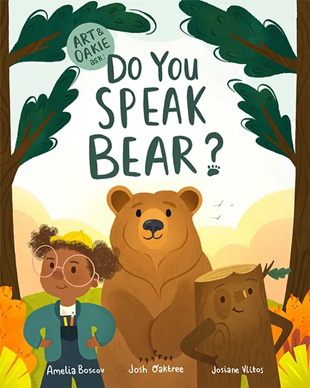
image c. 2024 Oak Tree Comics
Cats Are Better Than People
Look, we’re just quoting the artist! Honestly! We met Helen Asia at her table at WonderCon, and admired her various feline designs on everything from t-shirts to enamel pins… to a complete Cosmic Cat Tarot Deck. You can visit her web site and see more of what she has to offer. Interestingly, we met her at a con in Southern California, but all her items are priced in British pounds…

image c. 2024 by Helen Asia
False rumour about furries’ “disruptive behaviour” in schools lead to protest

关于兽迷“在校捣乱”的不实传言引发学生抗议
Bringing (Buff) 3D Models to Life w/Gruff [FABP E43]

In this episode, we bring you “Just Gruff.” He’s... just Gruff. Nuff said. Learn more about Malaysia and how Gruff brings 3D modeling to life! ---- Timestamps: 00:00 Teaser 00:29 Intro 01:06 Guest intro 03:08 Meet Gruff! 05:56 Growing up in KL 09:54 Runescape and Pokemon 13:03 An all furry guild in Guild Wars 2 15:51 Getting into 3D modeling 21:11 Selling 3D models at cons 25:29 FURUM and Malaysian furries 28:33 Let’s go to Infurnity 32:40 Making grass and anthro figurines 36:40 Gushing over Von Lycaon 39:52 2D vs 3D art 42:01 Future plans 46:54 Social media shoutout 47:42 Outro ---- Social Media: Official FABP Twitter: https://twitter.com/foxandburger Michael: https://twitter.com/foxnakh https://www.youtube.com/channel/UCK9xoFQrxFTNPMjmXfUg2cg Burger: https://twitter.com/L1ghtningRunner Gruff: https://twitter.com/justGruff https://www.furaffinity.net/user/justgruff/ https://bsky.app/profile/justgruff.bsky.social https://justgruff.gumroad.com/ ---- Footage Credit: https://twitter.com/justGruff/media https://www.furaffinity.net/user/justgruff/ https://news.softpedia.com/news/Guild-Wars-2-Will-Be-Free-for-a-Whole-Week-Starting-September-25-459807.shtml Other pictures and video provided by Pixabay, and guest’s and host’s personal footage. Intro/Outro Music: WatR - Fluid ---- The Fox and Burger Podcast is one segment of our production house, Fox and Burger Productions. The podcast’s goal is twofold: 1, to know more about the Asian furry fandom; and 2, compare and contrast the Asian fandom with the Western one. If you have a guest that you would like to see on the show, please PM us! We will also take questions for our guests, so don’t miss this opportunity to know some amazing furs.
Cute, Round, and Available For Your Home
Another artist we ran into at WonderCon this year calls themselves Thousand Skies. Simply put: Their products are adorable. They’ve got stickers, enamel pins, plushies, fashion accessories, even squeaky toys for your pets… Corgis, ducklings, red pandas, tiger cubs, whatever is cute and rounded it’s their specialty. Take a look at their web site and you’ll immediately find just their most recent offerings — with much more to be found if you dig.
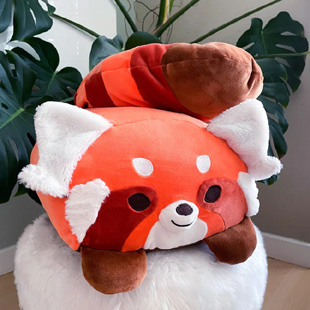
Image c. 2024 by Thousand Skies
TigerTails Radio Season 15 Episode 23

TigerTails Radio Season 15 Episode 23. Join the Discord Chat: https://discord.gg/SQ5QuRf For a full preview of events and for previous episodes, please visit http://www.tigertailsradio.co.uk. See website for full breakdown of song credits, which is usually updated shortly after the show. If you like what we do and wish to throw some pennies our way to support us, please consider sending a little tip our way. https://streamlabs.com/tigertailsradio/tip * Please note, tips are made to support TigerTails Radio and are assumed as made with good faith, so are therefore non-refundable. Thank you for your support and understanding.
Where’s Kuzco When You Need Him?
It’s always fun to come across a skilled artist with a unique and readily identifiable style. Sita Cardenas (or Retronerd as they call themselves) certainly fits that bill. We met them at WonderCon last month. Their specialty is fan art of gaming, anime, and comic book characters drawn in a distinctive style based on classical Aztec art. You’ve never seen the like! Look at their web site to see what we mean. They offer their art on pins, stickers, coffee mugs, and other cool items — not to mention they sell originals too.
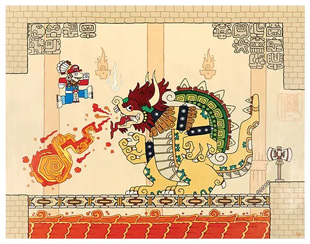
image c. 2024 by Sita Cardenas
S11E1 – Growing Up Digital - The cast is back with season 11! Klik, Roo, Sammy, and Vaos kick this season off with discussing growing up in a digital age. Join us as we talk about what it's like growing up in a world where digital devices are everywhere.
Klik, Roo, Sammy, and Vaos kick this season off with discussing growing up in a digital age. Join us as we talk about what it's like growing up in a world where digital devices are everywhere. Along with what it was like growing up before the modern conveniences, and hassles, that now dominate our world.
NOW LISTEN!
SHOW NOTES
Thank you!
Timid Grizzly and Zayne for the emails!
To all our listeners!
PATREON LOVE
THANK YOU to our patreons! You help us keep the show going!
Uber Supporter Tier
Anthallo
Tails Bursting out of Pants Supporters
Nuka
Fancy Supporter Tier
Black Baldrik, Lufis the Raccoon
Deluxe Supporters Tier
Tenax, Plug, MephistophEli
Plus Tier Supporters
Ausi Kat
Chaphogriff
Lygris
McRib Tier Supporters
TyR
Mengx3
Victor Mutt
Ichigo Ookami
Christian
MUSIC
Intro: RetroSpecter – Cloud Fields (RetroSpecter Mix). USA: Unpublished, 2018. ©2011-2018 Fur What It’s Worth. Based on Fredrik Miller – Cloud Fields (Century Mix). USA: Bandcamp, 2011. ©2011 Fur What It’s Worth
First Break: The Sky Is Beautiful - Rshand, Argofox, Creative Commons 2023
Second Break: Attraction – Rewayde, Argofox, Creative Commons 2023
Third Break: Right Here Beside You - Spence, Creative Commons 2020
Patreon: Inflammatus - The Tudor Consort, Creative Commons 2019
Closing: Cloud Fields (RetroSpecterChill Remix), USA: Unpublished, 2018. ©2011-2018 Fur What It’s Worth. Based on Fredrik Miller – Cloud Fields (Chill Out Mix). USA: Bandcamp, 2011. ©2011 Fur What It’s Worth. S11E1 – Growing Up Digital - The cast is back with season 11! Klik, Roo, Sammy, and Vaos kick this season off with discussing growing up in a digital age. Join us as we talk about what it's like growing up in a world where digital devices are everywhere.
Issue 20

Welcome to Issue 20 of Zooscape!
It’s easier to stare trauma in the face when it has the face of a cat. Art Spiegelman knew this when he chose to tell his father’s story, Maus, in the form of a graphic novel featuring mice, cats, pigs, and dogs rather than normal humans. It’s hard to look straight at the horrors and atrocities humans commit. Throwing in a little fur softens the hard edges, making it possible for us to reckon and wrestle with the harshness of reality.
Most of the stories in this issue wrestle with the darkness we have to face in this world, but they’re also beautiful, occasionally funny, and if you stick it out to the end, you’ll find one that’s just outright fun.
* * *
The Unbearable Weight of a Photograph by Jelena Dunato
The Last Life of a Time-Travelling Cat by A.P. Golub
Night in the Garden by Marshall L. Moseley
Proper Pedagogy by Jessica Cho
Rusty by Steve Loiaconi
Honey Harvest by Spencer Orey
The Three-Piece Giant by Gabrielle Steele
* * *
As always, if you want to support Zooscape, check out our Patreon. Also, you can pick up e-book or paperback volumes of our first ten issues bundled into three anthologies, complete with an illustration for every story.
The Three-Piece Giant
by Gabrielle Steele
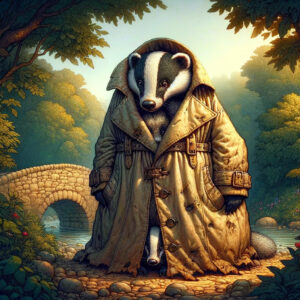 “The top badger was terrible at playing its own game.”
“The top badger was terrible at playing its own game.”
Alana stood one step shy of the quaint stone bridge, gripping her sword as she stared at the furry red leg that stuck out from beneath the frayed edge of the giant’s shirt. The battered clothing suffered an abundance of arrow holes, and its original owner had clearly met a rather gruesome end. A shiny black nose was poking through one hole mid-torso.
“I say, giant, can you hear me all the way up there?”
“We– I can hear you just fine.”
The voice coming from the shadows of a heavy hood was far too high-pitched for a giant. How had the villagers fallen for it? It was bad enough they only had one bridge leading to the spring paddocks. But it wasn’t Alana’s job to point out such foolishness. Her job was simply to remove the so-called giant. Honestly, a real giant would have been easier to deal with. They didn’t have magic. The large red and gold puck badgers of the fae forest did. They were weak when docile but dangerously feral if offended. The safest action was to play along.
“Mighty giant,” Alana said. “This bridge is surely too small for you, and the villagers think it best you find somewhere more suitable.”
“We’re quite happy here, thank you.”
Alana fought the urge to roll her eyes. The top badger was terrible at playing its own game. “The villagers need to reach their paddocks. If you like it here, you can fish just as easily from over there.” She pointed at a rock jutting out from the riverbank like a small pier.
The top badger whispered something down to the middle badger, whose muffled whispers seemed aimed at the bottom badger. With as much grace as possessed by a newborn foal, the pillar of badgers turned towards the rock. Two snouts appeared – one from between shirt buttons, the other above the waistband. Stern whispers passed up and down the column, then the extra snouts disappeared, and the badgers shuffled back to face Alana.
“It looks awfully cold,” the top badger said.
“What if the villagers offer you a blanket?”
“That would be kind,” the giant’s chest said.
“Shut up, Rusty,” the top badger hissed; then he looked at Alana with narrowed eyes. “That shan’t do. We like this bridge. It’s pretty, and the fish don’t notice us so much.”
“Someone as skilled at fishing as you could surely escape the notice of a few fish. Now though, this might interest you. I hear the fish around here can’t resist creeping close to listen in on a good song.”
If there was one thing Alana knew well about puck badgers, besides their extreme dislike of being laughed at, it was that they loved the sound of their own voices, especially in song form. The sound had been deemed so terrible, there were tales of it shocking birds so badly they fell dead from their perches. Listening to an overtired child screeching for hours would seem a joy in comparison.
The giant turned to confer with itself; then it wobbled about, its clothes sagging and bulging as if a huge deathfly larvae were about to burst out. Just the thought made Alana’s hand shift towards her sword. The undulating stopped, and when the giant turned back, a different badger had taken the top position — it had much rounder, friendlier eyes, as well as a large golden hoop hanging from its left ear.
“What songs do the fish like?” the badger said, who sounded like Rusty, previously the middle badger.
“Tales of the open ocean, my friend. They long to swim in it, but alas, the salt shrivels them until they’re nothing but sea slugs.”
“Those poor mites,” Rusty said, looking sidelong at the river. “I’ve the perfect song to soothe their souls.”
As he closed his eyes and opened his mouth, Alana did two things. First, she shoved wax plugs into her ears which, being one of a problem-solver’s most important tools, she kept tethered around her neck. Second, she tossed a piece of stale bread upstream of the bridge, in a place where some scree blocked the swift current. Not a crumb escaped the gluttonous fish, whose dark shadows now filled the calmer channel.
Rusty closed his mouth, and Alana plucked her earplugs free before he opened his eyes. He whispered to the middle badger, who whispered to the bottom badger, and the giant staggered to the bridge’s low wall. It would have been easy to push them in and earn her coin, but Alana wasn’t interested in murdering such harmless creatures — harmless to those with the sense not to insult them, that is.
Leaning forwards, Rusty peered over the wall. “Well, I’ll be a–” But Alana never got to hear what, for Rusty’s foot slipped, and the giant’s head went tumbling into the river. The giant’s chest and legs screamed in horror, and each jumped separately to stand on the wall.
“Brother!” the shirt and trousers shouted together.
The pieces of clothing went flying, and both badgers dived in after their brother. In truth, Rusty would have been better off had they not. He’d already caught hold of a thick root and was busy pulling himself to the bank when his brothers slammed into him. He lost his grip, and the current caught all three of them. They thrashed about, making it painfully clear they didn’t know how to swim.
With a tremendous sigh, Alana unbuckled her sword and leaned it against the bridge wall with her pack. She pulled off her boots and socks, shirked her tunic and trousers, then dove into the frigid water wearing nothing but her smalls and the cloth that bound her breasts. Her chest froze, but she forced herself to breathe through the chill. Cold shock was the danger of rivers, one that had almost cost Alana her life as a child and that now had the badgers flailing as if they felt suffocated. All they did was waste their energy.
A fair swimmer, Alana caught up with the three silly creatures easily enough, but she had no way of hauling them all out together. She looked about and tried to form a plan, but the moment she was within reach, the fools caught hold of her. Two grabbed her arms, while Rusty wrapped his little arms around her neck, his vicious claws sinking into her flesh. Unable to move her arms, the weight of the badgers dragged Alana under.
It didn’t pay to be kind. She should have let them drown, given it was their own stupid fault. Yet, she couldn’t bring herself to push them away to save herself. With all her might, she kicked her legs, driving them back to the surface.
Alana sucked in a chest full of air. “Kick your legs, you little weasels.”
Rusty’s claws bit deeper. Full of anger, the badgers would surely find the stubbornness to survive. Alana only hoped they would forgive her once they were safely ashore.
Together, the four of them kicked, churning the water like the flesh-eating fish of Murir. Alana steered them towards the left bank, where a thick root stuck out into the river, and beyond it… By the gods. It wasn’t the river that near deafened Alana. It was a waterfall.
“Make a chain if you want to live, weasels,” Alana shouted over the roar.
In a surprising display of intelligence, the badger holding her left arm shuffled down to her hand, followed by Rusty, who pulled himself around the other badger’s back. When the third badger didn’t move, Alana ducked him beneath the water for a few seconds, then bared her teeth at him. He soon moved across, settling between Rusty and the other badger instead of taking the end position. Coward.
“Grab the root, Rusty,” Alana yelled.
Hearing his name seemed to spur Rusty into action. They all kicked and stretched as they sailed towards the root with terrific speed. Rusty grabbed hold, sinking his claws in, but the speed of the river wrenched his paw away.
Alana searched the bank for anything else they could grab. There was a thin root just before the fall — their last hope. She flipped onto her back and started kicking against the current, hoping to slow them. The badgers did likewise, but their little legs were slowing. Even Alana felt drained, frigid as the river was. She kept kicking, pushing herself even as her chest burned for more air.
Alana wanted to shout at Rusty to grab the root, but she hadn’t the breath. He stretched his arm out anyway; then Alana did what she needed to. One by one, she prised the claws from about her hand, then pushed that badger towards the bank. Exhausted, she gave herself up to the river. Rusty stared at her with wide eyes, his paw wrapped about the root. Then the world tipped, and Alana took a deep breath before she struck the water far below.
Lost in darkness, Alana couldn’t tell up from down, or if she were conscious at all. Numbness had claimed her body. Her head struck something; then she faded into true darkness, the metallic taste of blood sharp in her mouth as she went.
* * *
“Is she dead?”
“Can we eat her?”
“Rats, the pair of you. She saved our lives, and you’re thinking about eating her?”
“I only asked.”
Alana groaned as her eyes slowly opened. Blinding light made her head pound, so she closed them again.
“Did you see that, Peapod?” Rusty said. “You can’t eat something that’s still alive.”
“What do we do with her then?”
“She looks badly hurt,” Rusty said. “I don’t think human legs are supposed to bend that way, and her head’s bleeding an awful lot. Say, Walnut, go fetch Old Willow. He’s not far downstream.”
“Right-o, brother.”
The world went blissfully quiet again, save for the hushed whispers of Rusty and Peapod. It sounded as though they’d moved away, or perhaps it was Alana who was far away. She couldn’t feel her body beneath her neck, and her head hurt so much she wished she’d drowned beneath the falls. A wave of nausea overcame her, and she vomited. With no way to turn her head, she began to choke.
“By the great lord’s fine stripes,” Rusty said.
“What do we do, brother?” Peapod said.
“I don’t–”
“Stand aside, stand aside,” said a deep, commanding voice. “Dear me, I’ve never seen one this injured before. My bag, little one.”
Over her choking, Alana heard the rustle of a jute bag being dragged over stone. Someone turned her head, bringing another wave of dizziness upon her. Her stomach emptied, clearing what had choked her.
“This is beyond my skill, my friends,” Old Willow said. “I fear to give her my pain tonic, for she has no control of her functions. You must call for the White Stag.”
One badger let out a little squeal of fright as another scurried away. Alana couldn’t blame them. The White Stag was infamous. They were both a stag of snowy pelt and a woman with unnaturally white skin, as if no blood ran through their veins. Indeed, that was probably true, because their favourite meal was the blood of men, particularly those who had recently dipped their wicks, be it in man or woman. Being a fair maiden upon a noble stag, it was easy for them to seduce any man. So Alana had heard.
The world seemed to get further away. Alana could guess her injuries. A broken neck and a cracked skull. There was no coming back from that. Old Willow would have been better to kill her himself than call for the White Stag, who was notoriously jealous of beautiful women. Perhaps Alana’s injuries were enough to protect her from a long, agonising life as a snowflake passing through flames and reforming in perpetuity.
Two badgers squeaked, and even Old Willow drew in a sharp breath. Swift hoofbeats sent bolts of agony through Alana’s head, but they quickly faded. Given how wet the ground was beneath her head, she must have finally bled out. It was a good life, but she shouldn’t have saved those damn badgers.
“Saving them is the only reason I’m healing you, human,” a melodic voice said.
As if by magic, which it probably was, feeling spread through Alana’s body. There was no pain, not even the ache in the tooth she’d been planning to have pulled. She opened her eyes and marvelled at the beauty of the stars above. Except they weren’t stars, for the sky hadn’t yet darkened. Laughter like the chiming of a tiny bell made Alana sit up and scoot away. Such a fair voice could only bring trouble.
“Humans are adorable when they’re afraid, don’t you think, Old Willow?” the White Stag said through the woman’s mouth.
Old Willow nodded quickly in reply, eyes averted. Alana couldn’t tear hers away. Both of the White Stag’s forms were beautiful. They glowed with a faint white light, and twinkling sparks of life floated through the air around them. Snowy felt coated the stag’s antlers, and the woman’s hair, even her eyebrows, were the same soft white. Her pupils, though… They were blood red.
Rusty sidled up to Alana and nudged her with an elbow. “You must thank them,” he whispered. Then he let out a whimper and scuttled away as the White Stag’s gaze moved to him.
“Thank you indeed,” Alana said, knowing one must always be polite and honest where fae creatures were concerned.
The woman grinned, and the stag snorted, tossing its antlers up and down. “It makes a pleasant change to find an educated human. There is a condition to your healing, however.”
Alana swallowed the stubborn lump in her throat. “And that condition is?”
“I rule the Araethan Forest here, so I have sensed you creeping within the border. You have always been respectful, which is why I have yet allowed you to live. I am sure you will soon find your healing to be a curse, however. You will live among us, solving our problems now, not those of humans. Stray from this task, and I shall undo your healing in an instant.”
Alana got up and lowered herself onto one knee, suddenly ashamed of her near-nakedness. “Your curse is a blessing, oh graceful one. To walk among magic folk and learn of your ways shall be a delight.”
“Flattery will get you nowhere with us,” they said. “Go with the brothers you have saved. They owe you a life debt, and it will take much work to pay that out.”
The woman climbed onto the stag, and they galloped away, lifting a hand in farewell.
“Well, I’ll be,” Walnut said.
“You’re lucky to have met her and lived,” Rusty said. He took hold of Alana’s hand. “Come now, lass. We’ll find you a place to stay. If we ask the trees nice like, they may give us wood for a cabin.” He tried to pull her along, but Alana tugged her hand free and turned to bow to the tall man-like creature who stood nearby.
“My thanks to you, Old Willow.”
“Off with you, lass,” he said, picking up his bag. “The White Stag will think you’ve rejected their gift if you linger.” He strode towards a willow tree downstream.
Rusty tugged on Alana’s hand. “Come now.”
Peapod took her other hand, and as they led her into the forest, Walnut danced ahead, singing a tale of the White Stag. If only Alana’s hands were free, she would have plugged her ears.
* * *
 About the Author
About the Author
Gabrielle Steele lives in Essex, UK with her husband and two mischievous younglings. She writes epic fantasy and speculative shorts, pitting poor souls against dragons, gods, and the occasional squirrel. You can view her ramblings on Twitter @eldris and find more about her writing on https://thellian.com
Honey Harvest
by Spencer Orey
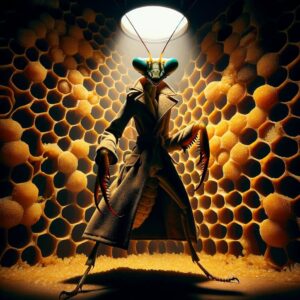 “Bugs came in looking for a safe haven, then got so hooked that they’d pay anything to keep the honey flowing. I’d been one of them. I just hoped I wouldn’t be one again.”
“Bugs came in looking for a safe haven, then got so hooked that they’d pay anything to keep the honey flowing. I’d been one of them. I just hoped I wouldn’t be one again.”
It was late when she buzzed into my office in the shrub. This time of the year, I expected grasshoppers, maybe someone left behind in a migration. No such luck today. She was a mantis, same species as me, the kind I’d run away from before the cockroach war changed everything. These days, I didn’t see much reason to run. Better to sit still and let her eat.
“I heard you can find anyone,” she said.
Disappointing. But at least a job would give me something to do. “Sure,” I said. “When’s the last you saw him?”
“Her,” she said. “She vanished last night. After…” She ran a front leg up to straighten one of her antennae. “After she tried to eat me. I want her to know it’s okay. That I forgive her.”
Made sense. Some mantises got the hunger something terrible, couldn’t stop themselves from biting the head off of someone they cared about even when they knew they’d regret it later. Back before the war, I never would’ve understood something like that. Now, I knew we all had it in us to do something monstrous.
“Anywhere you think she’d hide?” I asked. But I already knew where to look. There was only one place any of us went when we messed up so bad that we needed to forget everything. The hive. The one place I never wanted to see again. It was always the hive.
* * *
By the time I glided in, it was late enough that even the fireflies were done flirting. They’d settled onto tall grass stalks, giving a final flickering show to some collector spiders in the shadows who were probably hoping for another chance at dinner.
I scuttled to the door, where two cockroaches accepted my entrance fee and waved me through without any questions. Maybe they still recognized me from the old days, or maybe I still looked hopeless enough to belong in a bad place like this.
Even from the doorway, the sweet smell hit me hard. Here I was, back in the trap, after everything I’d done to stay away. And the hive was one hell of a trap. Most bugs didn’t need to sleep, but staying outside at night wasn’t safe, especially when the weather turned cold. That’s where the cockroaches came in. After the war, when there was nobody left to stop them, they’d colonized a beehive and expanded it into a business. Bugs came in looking for a safe haven, then got so hooked that they’d pay anything to keep the honey flowing. I’d been one of them. I just hoped I wouldn’t be one again.
The front parlor was crawling with flies, most of whom wouldn’t see the sky again. I shouldn’t have blamed them for wasting their short time like this, but I did. Drinking sugar water until your legs curled was no way to live. And that’s most of what I tasted in the air, watered-down honey, dripping down the walls and into the troughs. Bigger bugs were in the back. A few locusts crouched around a trough of what was probably alfalfa honey, based on the flowery spice. I even spotted a wasp, slinking away.
“Ah, the private eye returnsss,” a voice hissed to my side. “What’sss bugging’ ya today? Heh heh.”
Roach. He ran the place. We had bad history together from the war.
“I’m looking for a mantis,” I said. “A dame. Seen anyone like that tonight?”
“Maybe I have, maybe I haven’t.” Roach’s wings twitched. He knew something alright. He always did. “What’sss it to you? Finally looking to get your head bitten off?”
Right, a bite. Just like in the war, when Roach led my friends into an ambush, and the wasps bit off their heads. Nobody had been able prove he’d led them into trouble on purpose. We all suspected the roaches of being malicious, but they kept getting away. Except, when the war ended, it turned out only the cockroaches had survived without taking heavy losses. The rest of us — wasps and mantises and all the other bugs who just so happened to be the cockroachs’ natural predators — discovered we’d had our numbers thinned out. Sure, we were furious, but we were broken. Nobody could fight anymore. Any talk of revenge died in places like the hive, where we all tried to forget what the cockroaches had put us through while we gave them everything we had left. But not tonight.
“Listen up, you larva.” I lunged forward and grasped Roach’s front leg, ready to snap it free. “How about you tell me where she is, and I’ll forget I saw you here tonight.”
“Maybe I sssaw a mantisss back in framesss,” Roach hissed, legs spindling around as he tried to slip free.
I let him go. “Good. Thanks.” If she was back in the frames, things were even worse than I’d suspected. I might even be too late.
“Wait. It’d be a pity to lose a good cussstomer.” Roach massaged his leg. “Surely it can’t hurt if she ssstays a couple more daysss. How about it, old friend?” He reached out with one of his legs, offering me money, a thick roll of bills.
A bribe. A good one at that, more than I was being paid for the job. More than I’d been paid in a long time. Whoever this dame was, she had to be a real high roller to be worth that kind of cash. That or someone was paying to eat a mantis, maybe a frog on the outside. Money like that could buy me a month of the good life. It’d be easy to do as Roach said, to back off and then come pick up whatever remained of the dame’s corpse. But I didn’t need anything else to keep me up at night.
“Keep your dirty cash, Roach.” I scuttled away, past a table of centipedes, all the way to the back wall, where a rhinoceros beetle guarded the doorway to frames. I paid him and went inside.
Most bugs either couldn’t tell the difference between sugar water and orange blossoms or just didn’t care. But anyone who stayed in the hive long enough developed a hard craving for something stronger. And that’s what you could get from frames.
It was a loud place and darker than the main floor. The far wall was packed with bee drones hard at work making honey for the cockroaches to sell to the rest of us. Below the wall, honey dripped down into a trough before it got piped elsewhere for dilution and distribution. But tonight, it wasn’t just bees buzzing. Something else buzzed too. Something familiar. Something bad.
I twisted away as a stinger darted at me from the side. A wasp. I raised my forelegs in defense, ready to strike back.
“Hey you two! Cool it before you anger the drones,” someone called from inside the trough.
“I recognize you from the war,” the wasp slurred at me. She only had one wing but kept buzzing it like she could still fly if she tried hard enough. Honey clung to the sides of her mandibles and her eyes. She’d eaten so much she couldn’t even see straight. I didn’t recognize her. Chances were, we’d never met. But she could still hate my species.
I raised my forelegs higher, ready to slash. It’d be a good fight, just like the bad old days.
The wasp wove to the side, looking for weakness. And as she moved, I saw the bug who’d called out from the trough. It was a beetle, blue shell resplendent against the thick orange of the honey. Next to the beetle was the mantis dame. She was in bad shape, drooping in place, wide-set eyes too heavy. No way she’d last another few days of this. The cockroaches had set her on a path to her death, same as they’d done to the rest of us. My fighting a wasp would just play into their plans. I had to get her out of here.
I lowered my forelegs. “We all did bad things in the war. Things we regret.” Even talking about the war made little memories flash up at me. Stingers. Broken eggs. Cockroaches hissing with laughter. “Right now, I’m here on a job.”
“What kind of job?” The wasp feinted striking at me a few times.
“I came looking for that dame over there. Someone wants her home safe.” I decided to try getting honest. “Someone who loves her. Someone who wants a fresh start.”
“Love, huh.” The wasp’s wing stopped buzzing. “Not a lot of love around here. Not a lot of fresh starts either.”
“Not enough,” I agreed.
I scuttled closer to the trough. The mantis dame had her head lowered into the honey for a long bite. Her legs were already shaking badly. It wouldn’t be long until the roaches fished her out and fed her to whoever was paying.
When she came back up, I said, “Your gal sent me to find you. She wants you home.”
“Home? I don’t deserve a home,” the mantis dame said, voice heavy and slurred. “I tried to eat her. I lost control.”
“No, you almost lost control,” I said. I looked over at the wasp. The two of us, we’d done bad things we couldn’t take back. But this dame, she hadn’t done anything bad yet, just come close. She’d found out she had limits, same as the rest of us, and it’d scared her. I said, “You almost went over the edge, but you stepped back in time. That makes all the difference.”
The dame slurred something I didn’t quite catch, except, “…safer alone.”
“How I see it is, you want to pass your life alone, that’s your business. You can do that after you get out of here,” I said. “But if you run away from too many good things just because you’re scared, you’ll end up like the rest of us, trying to forget your way through a bad night. And trust me, eventually, they’re all bad nights.”
The mantis swayed a little in place. I could see she was almost convinced. Maybe she’d been telling herself the same thing before the honey got to her.
The wasp buzzed closer to her. “Go while you still can. There’s nothing for anyone here but bad memories.”
I offered a foreleg. “Let’s get you back to someone who cares about you.”
For a moment, I thought she’d tell me to leave again. Nothing I could do about that. Sometimes, my pedantic lectures didn’t work, no matter how honest I let myself get. We all still got to make our choices, no matter how bad they could be.
The mantis took hold and stepped one leg out of the trough. I could smell the honey on her, wildflowers, always something special. I remembered my old sweet stupor and suddenly, all I wanted was to climb into the trough myself. But if I did that, the mantis dame would lose her courage. And I didn’t need any more drinking buddies.
We headed toward the door. The mantis stopped, then turned back to the wasp. “You should come too. We can find you a place to stay.”
“It’s too late for me, kid,” the wasp said. She gave me a quick salute, then buried her mandibles in honey. She’d made her choice, as much as I hated to see it. I saluted back.
I said, “Let’s get you home.”
Roach was waiting for us outside of frames. Then I found myself staring into the eyes of the rhinoceros beetle. Up close, she was ugly, sickly white with spots. Before I could tell her to move out of the way, a second beetle slammed into me from the side. I tumbled to the ground.
“Too bad you couldn’t sssee thingsss our way,” Roach said. “Girlsss, let’s give our friend a good long drink, on the house. I’ll take thisss other one to the collector.”
I twisted and slashed with my forelegs, but the two beetles held me with their horns and pushed me to the nearest trough. I kept fighting even as they shoved my face toward a honey trough. They pushed harder, and then I was sinking in. I twisted my head to the side, but that sweet stickiness seeped onto my face, coated my antennae. It was the cheap stuff, thin and runny. Sugar water. And it smelled wonderful. I tried to lift my mandible away, but the beetles pushed my head fully in, and warm honey seeped over my face and into my mouth, my first taste in far too long. I opened my mandibles and took a full bite. Then another. I stopped fighting, and when the beetles relaxed the pressure on me, I pushed myself the rest of the way into the trough.
I started eating the honey. Then I ate some more. I ate for a long time, letting it all fade, losing track of time, losing everything. I’d forgotten this bliss, how memories could fade into perfect empty sweetness.
Then someone ruined it. They pulled my head out of the trough, then pushed me out, onto the sticky ground. The mantis dame. She said, “Looks like you get a fresh start too.”
“Perhapsss we can come to an underssstanding,” Roach said.
She let go of me. I heard a buzzing of wings, followed by a hissing scream. With my vision still blurred from honey, I saw things in little flashes. The mantis dame bit hard into Roach’s head. Far away, a rhinoceros beetle had lowered horns to charge our way across the floor. I had to help, but I was weak and slow. I wouldn’t reach her in time.
One wing buzzed loud. The wasp leaped through the air and came down hard, stinging the rhinoceros beetle in the side. The beetle screeched in pain and slammed into a trough of honey. Flies scattered into the air. Hatches opened around the floor, and hordes of cockroaches came hissing out to keep the peace. Some of the other bugs poked their heads out of the honey in languid interest.
Roach was flailing in the mantis dame’s grasp. His head was gushing fluid from his bite wound, but he’d live. The mantis must have stopped herself from killing him.
She said, “Let us out of here now, or we’ll kill you all.”
My limbs were still sticky and heavy. I could barely stand.
“Let them go!” Roach hissed. “Get them out of here!”
The mantis dame released Roach and grabbed me, pulling me toward the door. The cockroaches made an aisle for us, hissing in anger. The wasp buzzed close with us, darting forward with her stinger whenever a cockroach came too close.
And then we were out in the night. I still wanted to sink into honey, away from all the memories flooding back. But I knew better than to give in. And this time, maybe not all of those memories would be bad. The night was full of predators, but right now, it was a night full of bugs who could still forgive each other. A mantis had forgiven herself enough to try living again, and somewhere out there, her lover was waiting for her to return. Maybe that was enough to earn me another day.
* * *
 About the Author
About the Author
Spencer Orey (he/him) is a writer living in rainy Denmark with his insect-loving family. He is a graduate of the Odyssey Writing Workshop and his short fiction has appeared or is forthcoming in Tales from Fiddler’s Green and Flame Tree Press’s Lost Atlantis anthology. He has a PhD in cultural anthropology, with academic interests in magic, mobility, and media dreams that he loves to weave into stories. You can find him online at www.spencerorey.com or @spencerorey on Twitter and Mastodon.
Rusty
by Steve Loiaconi
 “You’d be surprised what people will admit to when a mangy terrier is standing over them with a whirring power drill in his paws.”
“You’d be surprised what people will admit to when a mangy terrier is standing over them with a whirring power drill in his paws.”
Whenever there’s a crisis in Action Cove, the mayor calls in these jamokes.
Sparky is a labradoodle who tools around in a modified fire truck. Siren, the German shepherd, drives an excessively armored police car. Then you got Splash, a collie with a hovercraft; Slate, a boxer in a bulldozer; and Sting, a chow chow in a little yellow helicopter.
They take orders from Cash, an inexplicably wealthy 15-year-old with a good heart and a quaint notion of justice.
I got to hand it to them. Most days, those pups do a decent job of keeping the peace. Saving cats in trees, stopping petty crimes, putting out warehouse fires, and whatnot. Then they sing a little song and take a nap.
But a town whose entire law enforcement and emergency response apparatus is handled by talking dogs makes an attractive target for hardcore criminals. There are cases when they’re out of options, when the clock is ticking and lines need to be crossed.
That’s when they call me.
My name is Rusty, and I don’t mind getting my paws dirty.
I’m mostly Jack Russell with a hint of Doberman and a pinch of pit bull. Cash says he likes me like he likes his coffee: small, fast, and mean.
I don’t think he’s ever had coffee.
Half the time, I don’t even need to touch a guy. You’d be surprised what people will admit to when a mangy terrier is standing over them with a whirring power drill in his paws.
Up in the watchtower, I fill up my dish with black coffee. Slate is running an obstacle course; Sting is watching cartoons; and Siren is filling out some paperwork that she thinks is very important.
“Councilman Calamity is at it again,” Splash says, nudging the pages of the newspaper with his nose. Groans rise up from the rest of the team.
This stooge, Councilman Chatsworth Calamity, keeps looking for ways to shut us down. Whether it’s proposing budget cuts, advocating stifling new regulations, or — as today’s front page reports — signing contracts for some prototype robot dinosaur police force, the dude is a constant thorn in our paws.
“That city councilman is only still breathing because you twerps won’t let me off the leash,” I say, under my breath but loud enough for everyone to hear.
“We can’t just go around assassinating people,” Siren barks.
“Won’t isn’t can’t,” I say, lapping up a mouthful of coffee.
“Cash said no.”
“Yeah, well.” I glance out at the setting sun. “Cash says a lot of things.”
Sparky stumbles into the room.
“Everybody coming to my show tomorrow?” he asks.
There’s a chorus of of-courses and wouldn’t-miss-its.
Sparky is putting on a one-man show at the theater downtown. I’ve seen him rehearse. It ain’t Shakespeare, but it’s cute.
They’re always so damn cute.
“Any of you guys read my erotic Kojak novella?” I ask.
The room goes silent.
I emailed them all copies weeks ago, and it’s only 75 pages.
“Who’s Kojak?” Sting says.
It takes every ounce of restraint in my wiry little body not to leap across the room and rip his throat out.
The flashing lights on our collars break the tension.
“Cash needs us,” they howl in unison.
Everyone shimmies into their shiny uniforms and lines up for the briefing. I hang back by the window.
“We’ve got a problem, doggos,” Cash says, standing before a massive computer screen.
He taps his keyboard and brings up a mugshot and a map.
“This guy’s a demolitions expert from out west. The state police nabbed him speeding down Route 27 north of town. When they pulled him over, he couldn’t stop bragging about the bomb he placed somewhere in Action Cove. He said it goes off at seven p.m.”
We all turn to the clock on the wall. Quarter past six.
“Rusty,” Cash says, “I’ve been questioning him for over an hour and time is running out. It’s your turn.”
I nod and push past the other dogs.
“His name is–”
“I don’t want to know his name.”
I pick up my work bag with my teeth and slouch down the hall.
“Zap his nuts!” Slate shouts.
Always with the nuts, this guy. He doesn’t appreciate that there’s an art to this. None of them do. They just turn their heads, eat their yummy treats, and play their silly games.
I slide open the door of the interrogation room. Under a spotlight in the middle of the blood-and-dirt-stained linoleum, the thug sits chained to a metal chair.
He laughs when he sees me, like they always do. I lay my tools out on the floor, making sure he sees the array of knives, saws, and needles. That stops the laughter right quick.
This is the fun part. I spring back on my hind legs and swing my paw across his face. Then I hit him again and again. And again.
I wail away until hitting his jaw feels like punching a bag of kibble.
“Still not talking?” I grunt.
I retreat to the corner, and I relish the panic in his eyes when I return. It ain’t easy to carry a flaming blowtorch between your teeth without singing your fur, but it’s worth it.
“Stop,” he mumbles. “Please stop.”
My tail wags.
I power down the torch and sit attentively.
“It’s under the lighthouse,” he says, coughing a gob of blood and teeth on the floor. He gives me the deactivation code, and he tells me who hired him. I’m not surprised.
I march out of the filthy room, my head held high.
Cash lays out a plan and the rest of the team springs into action. They hurry down the slide to their vehicles. Action Cove is saved again.
“You’re a good dog, Rusty,” Cash says before he launches himself down the slide.
“No, I’m not,” I grumble. “And that’s the way you like it.”
As they race off to complete their mission, I curl up in the dark and weep.
* * *
 About the Author
About the Author
Steve Loiaconi is a journalist and a graduate of George Mason University’s MFA program. His fiction previously appeared in Griffel, True Chili, the Good Life Review, Samfiftyfour, and the Saturday Evening Post, as well as the anthologies Dracula’s Guests and P is for Poltergeist.
Proper Pedagogy
by Jessica Cho
 “…they pulled strings from theories, tangled and untangled equations, sliced through Gordian knots with claws as sharp as Occam’s razor.”
“…they pulled strings from theories, tangled and untangled equations, sliced through Gordian knots with claws as sharp as Occam’s razor.”
When the doors of the Universities across the world first opened to them, the cats, for all their sheddings and shortcomings, took to those academic halls the same way they took to sunbeams and soft places.
They paced through their research with a hunter’s single-minded focus, ears high and alert for any sounds of interest, ferreting out facts like mice from the walls.
The linguistics department welcomed their nimble voices, well versed in a wide range of sounds, but even more their subtlety of jaw and gesture, their ability to communicate across oceans of silence.
From laboratories and lecture halls, they pulled strings from theories, tangled and untangled equations, sliced through Gordian knots with claws as sharp as Occam’s razor.
To all indications, they excelled.
But in the quiet depths of a building of cracked stone and creeping ivy, lies an old tabby, his body curled in proportions the envy of any Renaissance painter, who understands that chasing knowledge is an exercise as futile as chasing dust motes — imagined specks that disappear as soon as they’re grasped.
He sleeps undisturbed, a scholar in perfect repose, for he knows the key to understanding cannot be found in study or debate. The language of the Universe is neither math nor science, but rather the frequency that thrums in perfect resonance, the sound at the centet not a roar, but a purr.
* * *
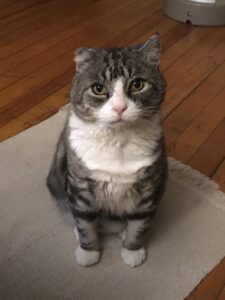 About the Author
About the Author
Jessica is a Rhysling Award winning writer of SFF short fiction and poetry. Born in Korea, they currently live in New England along with their cat Mushroom, who, as far as anyone knows, has no aspirations of higher learning. Previous works can be found at Fantasy Magazine, khōréō, Fireside Fiction, Flash Fiction Online, Daily Science Fiction and elsewhere. They can be found online at semiwellversed.wordpress.com and on Mastodon @jcho@wandering.shop
Night in the Garden
by Marshall L. Moseley
 ““Phoenix!” I said. “Mouse isn’t waking up!””
““Phoenix!” I said. “Mouse isn’t waking up!””
“Mouse?” I gently reached out and tapped him with my paw, but my little gray friend lay inert. Still.
We had been playing in the grass the way we always play. The game – you know it, I’m sure – was cat and mouse. Our respective species had once played it in deadly earnest, but over time, after the garden’s MedNanites gave us minds and we’d become friends, we played it for fun.
I hadn’t shaken him that hard. I’d shaken him harder before, and he’d always lain still for a moment, and then bounded up with a cheery “Good one, Cat!” and we’d go on with our play, or wander down to the stream to sip some water, or over to the food trees for some kibble.
The Phoenix would know what to do. I left my friend lying on the grass and ran out of the meadow and up the short grassy hill to where the giant bird was always perched on a rock at its top. As I ran I looked up at the skydome, and its plates were no longer a bright sky blue, but darker, like I remembered dusk being before the escape. And there were cracks in them.
I ran up to the Phoenix and stopped. He no longer stared straight ahead, looking sleek and regal, awaiting questions or requests. His rainbow plumage was ruffled and sticking out everywhere, and his head was down.
“Phoenix!” I said. “Mouse isn’t waking up!”
“Fazzit… fa… failure… system,” the once regal bird said in a voice I didn’t recognize. Instead of his gentle baritone, he spoke in a monotone, almost like he wasn’t alive. “Neutron star… gravity well… MedNanites offline… gravity shear imminent…” He lifted his head and looked at me, and for a moment he was back. “I can’t fix it, Cat. I’m so sorry. It’s–” and then his head dropped.
He was gone.
I turned and ran back down the hill. I looked up; the plates were darker now, and there were more cracks. All around me I heard a faint creaking sound.
Mouse was where I’d left him. I looked up at the skydome one last time. Then I laid down and curled myself around him, and as the sky went dark and the wind howled, I mourned my friend.
* * *
 About the Author
About the Author
Marshall L. Moseley has been writing fiction of one kind or another for forty years. His screenplay, WILDCARD, placed in the top three of the third season of Project Greenlight, and he appeared in the show. He subsequently optioned it to Dimension Films, a division of Disney. His stories have appeared in ROAR 6 and Inhuman Acts, and he was nominated for a Cóyotl Award in 2015. He is a member of the Wordos Professional Writers workshop in Eugene, Oregon.
The Last Life of a Time-Travelling Cat
A. P. Golub
 “So I wait, flitting in and out of Stjepan’s life like the ghost of what wasn’t — like revolution and socialism and the idea that there won’t always be someone trying to take advantage of someone else.”
“So I wait, flitting in and out of Stjepan’s life like the ghost of what wasn’t — like revolution and socialism and the idea that there won’t always be someone trying to take advantage of someone else.”
Stjepan saved me when I was a kitten 56 years ago (his time, of course). My own time has been spent less… linearly. He recognizes me, I think, when I curl at his side on the hospital bed. He doesn’t say anything, but his hand scratches under my chin like he used to do. His hands are frail. Not like they used to be. I am thinner now, and my fur isn’t thick and soft like it once was.
Soon, he will be gone, and I will go, too.
But for now, I want to pretend that I am just a cat, and he is still a young man.
I can still purr, rumbling my old body as loud as any kitten can.
* * *
He found me in the mud on the riverbank. Stuck fast and exhausted, I was done. Then Stjepan picked me up, cradling me in his big, strong hands muttering about how there were better ways to kill a cat than by drowning. I could tell by how he held me close that he wouldn’t try any of them on me.
I wanted to tell him the truth — that it was my own bad luck that saw me in that mud.
Cats don’t have nine lives, but some of us are born with a gift of time travel, the gift of flitting through the years and lingering where we will. Mother said we were only supposed to use the gift when in danger. Of course, being a kitten, I used it to try to steal cream.
And that’s how I wound up on a muddy riverbank in the then Kingdom of Yugoslavia in the darkening 1930s. Of course, cats can time travel, but we can’t talk, so couldn’t correct Stjepan.
He took me home and gave me a bigger bowl of cream then the one that got me into this mess.
So I stayed.
* * *
Stjepan talked to me like I was a human, telling me of change, labor rights, land rights, and strikes. He told me that once we weren’t a country; then we were a country. One day, he said, the people would build a better country: he honestly believed this, even as members of his party were imprisoned or killed.
Even as he hid his own beliefs to keep work, to stay alive.
One day, we wouldn’t even need countries, he said. The people would abandon such constructs. And what is a country but a construct? What is a movement but seeds, planted by others, that will bloom in time? Stjepan booped my nose as he said it.
I suspected he’d had too much to drink that evening.
Still, I liked that he respected me enough to tell me such things even if I didn’t understand any of it. Cats need no country, and our movements are always our own. Humans put such constraints on themselves. Maybe, maybe I did understand it, in that I understood that Stjepan wanted to be more like a cat.
He said he was going to move to the city.
Purring, I laid on his lap. I ignored the pull of time, wanting me to leave. I imagined it felt much like the pull of the promising future felt to Stjepan.
* * *
We didn’t make it to the city.
War came again to our country that wasn’t/was. And Stjepan wanted to fight.
He cried as he said it. He cried because he would be leaving me with his sister, Marija, and because Stjepan’s future would be born in blood. Could anything beautiful be born from blood, he whispered, as he stroked my whiskers. I pressed my head to his hand.
His fingers ran under my chin (scritch—scritch—scritch).
“You’re beautiful,” he said, “and you were pulled from mud.”
* * *
Marija is kind.
She is kind to me, and she is kind to the people who come to her house.
They come at night, exchanging whispers and letters. There is fighting in the hills, but it spills over to these late-night meetings. It spills over to our life, in the way people disappear.
The enemy is the invader/the enemy are those we drank with/the enemy is—
Eventually they come for Marija.
I run.
* * *
I am not proud of this.
When the door slams open and men rush in yelling, I dart right through their stomping feet and out into the cold, lonely night.
Marijia is shouting back. Something crashes. Screaming.
Then silence.
I wish there was gunfire. I wish there was some certain ending.
She is gone, and she will not come back.
* * *
The future Stjepan saw had Marija in it. The future I try to run to has Marija in it.
But as I run through time, that future slips out from under me, like an unstable shelf or book laid half-off the counter. I cannot find the future. I am lost in the dark. At first, I think I am cursed for running. As if a cat could have stopped those men. As if a cat should die making a stand. That’s something Stjepan would do, not me.
Then I think that humanity is cursed, for killing so many infinite futures. This is closer to the truth, but it does not help me, lost in time.
I want to find Stjepan.
But the future twists away from me as more lives are extinguished. Each one was a path, a connection, a possibility gone. I run on through the darkness, unable to find the future I believed in, that Stjepan told me about.
We are always one step behind the future that will be.
* * *
One step behind means abandoned houses and empty camps. It means smoldering fires, put out just in the nick of time. It’s cold and everyone’s suspicious, even of a cat.
It’s the way blood drips off the wall.
There’s a body there — not Stjepan’s.
* * *
After the war I learned that Stjepan got a job in a factory, that he left the party, that he was a mechanic.
But curse or bad luck, I never see him.
There is the scent of oil and a swinging door.
I find a note — half-drafted, to Marija. Stjepan believes she escaped. He thinks she must have eventually made her way to the US. He tells himself that she thinks he is dead, and that’s why she didn’t come back. He knows for a fact that she took me with her.
This is how he protects himself from the reality that his sister is gone. He can’t see me because in his mind I am safe with Marija. Sometimes I think I could push through these futures, walk into the room and demand cream, meowing as loudly as ever. He’d pick me up, scratch my chin, and then his heart would break. I can’t bring myself to do it.
At the end of the letter, he says he hopes I am getting enough cream.
* * *
One step ahead, one step behind.
I do not have it in me to destroy the future Stjepan imagines for Marija and me.
So I wait, flitting in and out of Stjepan’s life like the ghost of what wasn’t — like revolution and socialism and the idea that there won’t always be someone trying to take advantage of someone else. Slowly, I gather my own years, live my own lives. I know there will come a time for Stjepan when his reality and the life he’s imagined for Marija will blur and fade together.
He’ll be waiting for me at the end. I will take him to the future.
* * *
The monitors at Stjepan’s side beep slower than I think they should, not that I’m well-versed in matters of the human heart. But the sound feels wrong. Stjepan isn’t mechanical beeping, fading away, he’s hope and strong hands. A hammer coming down steadily — like the heart should. The scent of iron and grease and the gift of cream.
“Mačkica…” His breath is reedy. He doesn’t finish his sentence.
I curl against his side, rolling into his hand and purring harder. Here is my past, and the future we should have had.
We will leave together soon, in the way dreams flee upon waking.
—in the way things are until they aren’t.
* * *
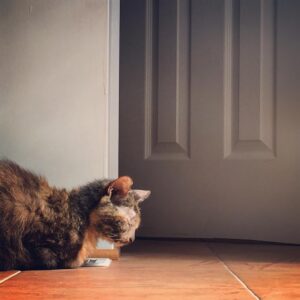 About the Author
About the Author
A.P. Golub is a speculative fiction writer residing in central Virginia with their partner, dog, and four cats in varying states of domestication. They’re a graduate of Viable Paradise writers’ workshop. Online, they can be found at apgolub.com or lurking on Twitter and Instagram as @andtatcat.
The Unbearable Weight of a Photograph
by Jelena Dunato
 ““According to the Shifter Control Act, you’re required to wear these.” The officer hands them silver pins in the shape of a wolf’s head.”
““According to the Shifter Control Act, you’re required to wear these.” The officer hands them silver pins in the shape of a wolf’s head.”
Roza runs down the corridor towards the bursar’s office, unladylike, her freckled cheeks red with exertion, auburn ponytail trailing behind her. Leather soles of her new oxfords slip on the polished floor and she skids past the door, flailing, gripping the doorknob in the last moment. Locked. She checks the clock above the notice board. Two minutes past four.
She sighs, ready to try again tomorrow, when a leaflet pinned to the board catches her eye. Secret Society of Shifters and Their Nefarious Protocols it proclaims in thick, greasy hectograph ink.
“Roza!” Lena’s footsteps echo in the empty corridor behind her. “What are you doing? We’re all waiting for you!”
“Reading,” Roza says softly, catching her breath as a slow, viscous shudder travels down her spine like a fat slug.
Lena, in a man’s shirt, her flaxen hair shorn by some mad artist, twists the corners of her mouth downwards as she glances at the leaflet. “Not that rubbish again. Why are people so obsessed with shifters?”
“They’re afraid of things they don’t understand,” Roza says.
“They’re everywhere around you, hiding in plain sight,” Lena reads from the leaflet and laughs. “Nonsense. I don’t think I’ve ever met one. Have you?”
“I don’t think so,” Roza lies in a smooth, well-practised manner. Her identity card is a fake, the genetic test that got her a place at the university a forgery. Can’t be too careful, her Papa always said, and she’s glad she listened.
“C’mon, don’t waste my time.” Lena grabs her hand and pulls her down the corridor. A minute later, they’re outside, running down the gravel path leading to the immense lawn. Hundreds of students sit on colourful blankets, enjoying the June afternoon.
“Lena! Over here!” somebody calls, and the two of them find themselves among Lena’s usual motley group of painters and actors and architects.
“I think you know everyone,” Lena says, “except maybe…”
A dark-haired young man is sitting on a yellow blanket, peeling a hard-boiled egg, his white shirt unbuttoned, sleeves rolled up. He’s broad-shouldered and lithe in an attractive sort of way.
“Franz, this is Roza,” Lena says. “Roza, Franz.”
“Sit down.” He pats the empty spot beside him. Roza takes her oxfords off and kneels down awkwardly, her pencil skirt too tight for lounging. “Egg?”
“No, thank you,” she laughs. Somebody pushes a paper cup filled with spritzer into her hand.
“Smile!” Georg, Lena’s photographer boyfriend aims a bulky instant camera at them and clicks. The camera whirrs, producing a slightly blurry image of Roza and Franz. She tucks it absentmindedly into her purse.
“So what are you studying?” Franz asks. His dark eyes gleam, focused on her face.
“Biology.” She pulls a carrot from a bag of vegetables and takes a bite. “You?”
“Mechanical engineering.” Still holding the egg in his fingers, he flicks his wrist, waves his other hand, and the perfect white ovoid suddenly appears on his neighbour’s plate. “And magic, obviously.”
“Obviously.”
The conversation between them flows without hindrance. They chat about their plans for the future the whole afternoon, impervious to sunburn and strange looks from Lena’s crew.
“It’s time to go,” Lena pronounces when the sun slips behind the Arts building. “We must get ready for the play tonight.”
“Ah, sure.” Roza brushes the crumbs off her skirt. She’s not really into the avant-garde art of Lena’s circle, but she likes the relaxed crowd. As the others turn and leave, Franz touches her hand.
“A quick drink?” he asks.
She’s had enough to drink, but still she follows him, feeling like a naughty child. They amble through the winding, cobbled streets of the town till they reach a small cafe with live music. It’s packed, but she doesn’t mind standing close to him. His hips attract hers like a magnet, and half a dozen cigarettes and two glasses of wine later, she finds herself glued to him, dancing to a slow tune. He bows his head, she lifts hers, and their lips meet in a long kiss.
She should go home, it would be the proper thing to do, but there’s something strange in the air that night. The sky above their heads is shiny and brittle like a glass bauble, the laughter is too loud and nervous and everybody is drinking as if the world is going to run out of alcohol. Beneath the glare and din, Roza senses a deep, slow thrumming; the fate marching towards them. So when Franz says, “Come with me,” she follows once again, light-headed and giggling.
He has an attic room in the old town, five creaky flights of stairs leading up to a lopsided door. A single bed, a sink, an ancient armoire and a desk — good enough for students, poets and rats.
His slim fingers unbutton her blouse and slide under her bra straps. She pulls his shirt out of his trousers and over his head and inhales his scent, entirely human, yet intoxicating. His lips slide down her hot skin, the tip of his tongue writes passionate verses. Her flesh is light and supple under his gentle hands, and she lets him touch her, feel every inch of her, slide inside her.
For one dizzy, blinding moment, she wonders if he can see what she is, if her skin is transparent like a parchment before a candle, revealing the foul secret of her shifter genes. She shudders, and he pauses immediately.
“Do you want me to stop?” he asks.
But no, humans have a poor sense of smell, and they have no way of telling a shifter from a human without genealogy or a blood test. It’s a ridiculous fear fuelled by those cursed leaflets appearing all over the campus. She banishes the thought and pulls Franz closer, skin on skin, mouth on mouth as their bodies merge, sailing the waves of pleasure together.
Afterwards, they share a cigarette, and she briefly considers shocking him with the story of her childhood, of running on four legs through the ancient green forests, of cuddling with her sister beneath the earth, safe in their den. Perhaps he wouldn’t mind. But she doesn’t know him, not really, and is unwilling to break the gossamer bridge of affection between them. There’ll be time enough for awkward revelations.
They remain bunked in that room for a week, darting out to get bread and strawberries and cheap wine. Running up the rickety stairs to fall on the narrow bed, breathless, and make love again and again.
While he sleeps, she searches his desk. Engineering, math, some history and poetry. No incendiary pamphlets, no tractates on the treacherous nature of shifters. No hate. When she slips back under the sheets, she feels guilty and mad. Franz sleeps; silver moonlight plays with the sharp shadows on his face. He is gentle and funny and talks about machines as if they were live creatures. He’s a great dancer and an even greater kisser. In a kinder, more normal world, she’d be wondering if he were The One.
Humans cannot marry shifters; it was outlawed a year ago.
As dawn pours its golden light over the rooftops on the eighth day, someone knocks on the shabby door. “Roza? Roza are you here?”
Franz groans in his sleep, but Roza recognizes the voice. She rushes to unlock the door.
“I travelled for two days and turned half the town upside down to find you,” Hana says, flushed from the climb. She looks leaner than before, and fiercer, her red hair in two perfect plaits, her eyes burning. “Papa wants you home immediately.”
“What? Why?” Roza bristles.
“Haven’t you heard the news? We need to report to the census office by Sunday.” Hana peers over her shoulder, curiosity softening her features. “Oooh, I see. Handsome. Does he know?”
“Shut up,” Roza hisses, pushing her sister out. “Wait here.”
She gathers her things quickly as Franz yawns and rubs his eyes. “Family emergency,” she says.
“I’ll call you.”
She kisses him quickly and manoeuvres out of his arms trying to pull her back to bed. One last glance at his unshaven face and she’s out, running down the stairs with her sister.
* * *
Things sour quicker than Roza can follow. The peaceful, happy village she left to go to university is grey and quiet now; the villagers’ eyes cautious and hard. The school is turned into a temporary census office, but instead of the kind old headmaster, a young uniformed officer sits at the desk. As Roza enters with Hana and her parents, she sees the local genealogy register opened on their family page, their real identities written down in a meticulous hand.
“According to the Shifter Control Act, you’re required to wear these.” The officer hands them silver pins in the shape of a wolf’s head. “Don’t leave the village, or you’ll be arrested.”
At first, Roza remains shut in her room, refusing to accept this new reality where people stare at her from afar but cross to the other side of the street when she comes near. The other shifter families sometimes visit furtively, and she hears her father talking to the men late at night. She refuses to socialize with their daughters; they have nothing in common but the cursed blood.
Hana is laid off from her teaching job. Roza knows how hard she worked for it and how much she loved it, but faced with her sister’s furious eyes, she doesn’t know what to say.
“They can’t do this to us,” Hana fumes, as she reads the smuggled newspapers aloud to Roza. “The Government now says they want to intern us for our own safety.”
Roza wonders if she should write to Franz, explain the situation, but words fail her. What could she say? I’m sorry I forgot to mention that I’m an animal. She could only get him in trouble.
The Government starts taking shifters away to an unknown location and the first bloody uprising breaks out – and is brutally put down – in the capital. All shifter families receive Government-issued pills “to restrain their dark nature.” A girl in the village bleeds to death, but the rest of them are forced to report every Sunday to the hard-eyed officer and swallow the pill before him. No one can shift anymore.
A young man Roza went to school with spits the pill before the soldiers. They drag him into the yard unceremoniously and shoot him.
The shot echoes in Roza’s ears for hours afterwards, rendering her numb.
“They’re coming for us,” her father says one evening. “It’s time to move.”
Roza fills her backpack. Warm clothes, a toothbrush, soap, some food. Leafing through her notebooks, she finds the photograph. The two of them, sitting on the yellow picnic blanket. A long-lost version of Roza, laughing into the camera, a paper cup in her hand, her hair a flaming halo. And Franz in half-profile, holding a hard-boiled egg, looking at her. It weighs almost nothing, so she pushes it into the secret pocket in her backpack.
Two days later, their father wakes them up in the middle of the night, and the whole family trudges across the fields, into the woods, to the old forest track. A van with its headlights off waits there. Hana and Roza enter and squeeze themselves between the silent people sitting inside.
“Aren’t you coming with us?” Roza asks her parents, her voice suddenly very small.
“We only had enough money for two,” her father replies. “Don’t worry, we’ll stay here in the woods.”
“No, you mustn’t—” Roza tries to contradict him, but the driver shuts the door and cuts her off.
She cries holding Hana’s hand as they move through the night forest. When the pills wear off – if they wear off – their parents will be able to shift again. But they can only stay in their shifter bodies for a day or two. A shifter who stays longer risks forgetting their human self and turning into a real animal.
Looking at the indifferent moon through the dirty window of the van, Roza thinks that’s not such a bad fate.
* * *
They get new identity cards and jobs at an ammunition factory in a drab industrial town where nobody cares who they are, and new machine fodder is always welcome. Hana joins the resistance immediately, slipping off in the night to attend secret meetings, whispering about propaganda and diversions and shifter troops in the mountains.
Roza pretends she’s normal and ignores Hana’s rage. She stubbornly treats this life as a nightmare that will pass soon, if only she remains small and silent and keeps her head down.
While Hana disseminates illegal pamphlets that attack the Government, Roza wears her one tight dress and goes out with other factory girls. She lets men with greasy hands feel her up in filthy bars that reek of stale cigarette smoke and piss. She thinks of Franz as they shove their tongues down her throat. Soon those men are replaced with boys in badly fitting uniforms, and then they disappear as well. What began as a cleanse turns into a war that spreads across the borders. A general draft spares only those too old or too crippled to fight.
Her beauty fades and so does Hana’s. Their glossy hair becomes brittle and dull. Hana hacks it off, Roza brushes it every night, crying, and hides it under a scarf during the day. Their bodies turn gaunt and tired, their bones creak in protest as they move. Their faces are hard and unfamiliar. Roza struggles to recognize her own reflection.
She sometimes wonders what happened to Lena and her artistic crew. Are they still at university, protesting this madness, producing sharp, furious art? Or have the boys been mobilized and girls sent to factories, so now they look just as harrowed and hopeless as Roza?
One night, the factory explodes and when Hana comes home, her face is bruised and her clothes torn and dirty.
“Close call,” she says, grinning. “They don’t know who I am, but they soon will. Time to move.”
As Hana packs her bag, Roza feels rage flaring in her chest. “Why do you always have to go and do something dangerous?” she says. “We could have stayed here, safe.”
“You want to stay here?” Hana asks, incredulous.
Their tiny room at the boarding house has mold growing in the corners and perennially smells of cabbage. A prison cell would be more cheerful.
Roza hisses, refusing to answer, and grabs her backpack. It’s winter outside, she dresses for the cold and tucks the photo in her breast pocket.
“Why do you keep dragging that stupid thing around?” Hana asks.
Roza wants to hurl back something sharp and hurtful, but in the end, she just says, “Because I liked him. Because it was real.”
The pity in her sister’s eyes cuts her deep. “That world is gone,” Hana says. “And everyone who inhabited it. Those people are dead.”
“No. I’m not dead. And neither is he, I know it.”
Hana shrugs and pulls on her boots.
“Where are we going?” Roza asks.
“There is a base in the woods,” Hana says. “For those who have nothing left to lose.”
* * *
They meet a group of desperate men and women before dawn. Roza keeps her head down, avoiding their eyes. She doesn’t know who they are, she doesn’t want to know. They leave the town and head straight for the woods. It’s freezing cold. The untouched snow reaches up to their knees and there is no path, but Hana leads them with grim determination.
When the sun rises above the mountains, they hear barking in the distance and know they’re being followed.
They trudge on stubbornly, hungry and exposed.
“We should shift,” Roza says. “We’ll move faster on four legs.”
“No,” Hana retorts. “We leave no one behind.”
Roza looks around and makes a quick tally: the ragged fugitives look half-dead in the morning light. Perhaps not all of them are purebloods, and some of them might be too old, too exhausted, or too poisoned by the pills the Government fed them to shift. So they continue slogging beneath the snow-laden pines, armed soldiers hot on their trail.
This deadly landscape in the sharp claws of winter terrifies Roza. Her toes are numb and every muscle in her body screams at her to stop. In order to keep moving, she slips away. The blurry photograph in her breast pocket, tucked under five layers of clothing, pokes at her ribs. She thinks of Franz’s kisses.
The photo is the only vision of the future she can muster. An unfinished business of the two people who fell in love one summer night. Perhaps she’ll find him again, in the next town, next rebels’ base. And then it will be easier to live through this evil, and fight it together.
She doesn’t realize she’s sobbing until Hana’s hand finds hers and squeezes it hard.
“Almost there,” Hana says, her breath a white, frozen cloud. “Up this hill and across the old railway bridge. The rebels should wait for us on the other side.”
“How can you be so sure?”
“I have my sources.”
Roza bites her lip and pushes on. While she wasted her time torn between daydreaming and despair, hundreds of grim, stubborn people fought the Government.
“This base in the mountains has a new leader,” Hana says. “A hero, determined to take back what is ours. It’s time to turn around and bare our fangs.”
“I’m scared of fighting.”
“They need other skills too. Nursing. Cooking. Teaching.”
The idea sounds more optimistic than anything Roza has heard in months. There are people like them, organized, led by someone who has a plan.
A shot pierces the silence and Hana falls with a gasp, pulling Roza down, a bloody rose blooming in the snow beneath her.
“Run!” someone screams, as the soldiers pour out of the woods, with their dogs and their guns.
Roza still holds Hana’s hand, though her sister’s eyes are empty, the side of her head blown up. She forces herself to let go and bolts behind the pines, running for her life. She expects a bullet any moment. It doesn’t come. Five seconds pass, then ten, then twenty.
She almost dares to hope she escaped, when a voice says, “Stop.”
He stands before her, a soldier with a raised gun. She closes her eyes and says a quick prayer. Time trickles away.
“Roza?”
She opens her eyes. The soldier removes the scarf that covers his mouth.
“Franz.” She gasps.
The gun shakes in his hands. “I always hoped I’d find you, but…” His eyes study her face as if there’s something crucial written on it. “Tell me you’re not one of them.”
The anguish in his voice breaks her heart and she finally manages to tap into Hana’s rage. She wants to tell him he’s an idiot poisoned by the Government’s lies. A brainwashed fool. A murderer.
But the snow and the blood and the gunshots echoing in the distance wipe away all reasonable arguments. Her sister is gone and Roza is too furious and desperate to care what he thinks when she says, “I’m not a monster, you are.”
And then, keeping her eyes on the barrel of his gun, Roza wills her body to shift. As her clothes fall to the ground, the photograph slips out. It lies on the snow, a perfect rectangle of fiery colours.
She stands lightly on her four feet now, a sleek young fox. Thick red fur protects her from the cold. She waits for the bullet.
Instead, Franz lowers his gun and picks up the photograph. He presses it to his chest.
“I’m so sorry,” he says. “I never—”
Shots thunder among the trees. Eyes locked on each other, they both know no words are powerful enough to carve a future for the two of them.
His gaze follows her as she turns away and dashes into the woods.
* * *
About the Author
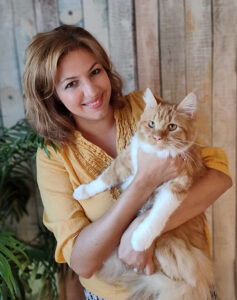 Jelena Dunato is an art historian, curator, speculative fiction writer, and lover of all things ancient. She grew up in Croatia on a steady diet of adventure novels and then wandered the world for a decade, building a career in the arts.
Jelena Dunato is an art historian, curator, speculative fiction writer, and lover of all things ancient. She grew up in Croatia on a steady diet of adventure novels and then wandered the world for a decade, building a career in the arts.
29-Year-Old Furry Considers Moving Out of Mom's House
It's been a long time since I last asked you a question, but I hope you're doing well. I'm messaging for some advice because rgis is something that's been on my mind for a good while. I currently live with my mom and it's not really bad, but there are times she can be more of draining to me than my own job. I'm more than happy to help with stuff or grab something she needs, but sometimes when I've just finished a tiring ten hour shift and just got home she'll ask me to go right back out to grab something for her when she's been home all day and could have went out to grab it herself.
There are times when she'll ask to use my car for something instead of her own for something. I don't mind since my car is bigger than hers and for groceries it certainly holds more, but there are times it messes with my own work schedule, and when I have no choice but to use her car, she'll leave it with little to no gas at all.
But most of the issues I feel I get are from just being around her. There was a day she called me from my room just to see me and say "You're getting fat." It made my day which was relatively nice feel much worse. She says how she wants me to lose weight and worries about my health and right now I'm around the 240's, I'm actively moving about at work and I maintain my weight rather well but all she sees is my belly and just goes back to that. It feels as if everytime we talk her tone makes it that she looks down on me, or at the very least like I'm still a little kid. I sometimes wonder what to do, even my sister suggests I finally move out.
I'm sorry for trailing on like this, my question after all of this is do you think it's a good idea for me to try moving out?
Kageichi (29)
* * *
Hi, Kageichi,
Please forgive me if I don't recall what we might have talked about in the past.
Before I answer your letter in more detail, could you answer a couple of questions? 1) Why, at 29 with a full-time job, do you still live with your mother? 2) What are the conditions for your living at your mom's house? (e.g., i.e., do you pay rent or have some other agreement for your continuing to live there?)
Thanks for your replies.
Hugs,
Papabear
* * *
Hello There
First of all, it's alright. It has been many years since I last sent a letter to you.
As for your questions, I live with my mom because while there are plenty of apartments a part of me feels pretty nervous too, I feel worried I might be unprepared to move out and handle being out on my own. A lot of things over the years just makes me have little confidence in myself. The living condition of living with my mom aren't bad. I help with some bills, and I give my mother 100 bucks a week. She never told me where the 100 dollars go to, but I just thought maybe it was for rent.
* * *
Okay, one more question if I may: how much $$ do you bring in per month? Also, does your job include any benefits like medical insurance?
Oh, and what city and state are you in?
* * *
I get paid every week and since I work almost 40 hours every week, my pay usually rounds up from 500 to $700 a week after taxes is taken out. My job does include health insurance and 401K which some of my cash goes to. I live in D***, SC.
* * *
Hi, again,
Okay, thanks for the information. So! Basically, you make about $2,400 a month take-home pay. I looked at apartment listings in the D***, SC, area, and you can get a studio or 1-bedroom apartment for anywhere between $800 and $1,500 a month or so. Let's say you find a good deal at $1,000 a month, leaving you with $1,400 a month. Let's further assume your car payment is $200 a month, leaving you with about a $1,200 a month for utilities, gas, food, sundries. That's not a lot in this economy, even in South Carolina (you wouldn't survive in an expensive state like New York or California). You're giving your mom $100 for rent a month (sometimes).
You should be kissing and hugging her "Thank you!" for saving you so much money. You should NOT resent her if she asks you to occasionally buy some food or to borrow your car. And if the worst she does is suggest you might need to lose some weight? I would hazard a guess she is genuinely concerned about you staying healthy. Don't take it as a slam (unless she says it in a mean tone to you, but it sounds like some of that is how you are taking her words).
If you moved out of the house, you would likely struggle financially unless you found a better-paying job. And, if you lost your job, you'd likely have to move right back in.
Instead of complaining about your mom asking for a few things, you should sit down with her and make out a JOINT budget in which you figure out how you can pay your fair share for the room and board she is supplying you. If your biggest complaint is that she sometimes asks you to buy some food after work when you are tired, that can easily be fixed by the two of you planning your grocery list ahead of time and going to the store together to make sure you have everything necessary. Set a rule that, unless it is something vital to purchase right away, she should not ask you to run errands right after work when you're tired. Schedule a time in your week when you run errands for her. You should also be paying her more per month. Compromise between the $400 and the price of an apartment, so, let's say, give her $750 a month. That's a good deal, and you should be grateful for it. If you don't feel like you can afford that (I don't know what other expenses you might have) then compensate by doing more chores around the house (you don't mention if you do any, but just because you work doesn't mean you can't do chores, too).
Moving out right now, while doable, is probably not the best choice financially. Your mother sounds like she is not bad to live with at all. If she treats you like a little kid, it might be because you are acting a bit like one by not helping to pay your fair share of the expenses at the house. She might be a little passive-aggressive with her criticism of your belly, so you should talk that out. Perhaps she's directing some frustration over you by saying you're chubby.
Sit down with your mom and discuss the following:
- Budget: Find out what her expenses are and what you can reasonably contribute to house payments, utilities, and gasoline. IMHO you are not paying your fair share of living expenses in a house you live in full time.
- Schedules: Come to an agreement as to how to do things that need doing without conflicting with your work schedule.
- Being respectful of each other's needs: Tell your mom how you feel when she says you're fat, but do it in a calm way. Explain that you know you've put on some pounds but that it hurts your feelings when she says that and talk about how both of you feel about your health. ALSO! Ask her about HER health, HER feelings, and HER needs. It's not all about you, Kageichi.
You're 29 years old. Time to step up. You don't have to move out (unless you want to), but you do need to show more responsibility and appreciate your mother more for helping you out so much. Whether you stay or go, you need to do the adult thing.
Take Care,
Papabear
Bearly Furcasting S4E46-The Wrong Podcast For All The Right Reasons
MOOBARKFLUFF! Click here to send us a comment or message about the show!
Bearly's away so the Pup and Raccoon play! In this action packed episode Taebyn and Rayne try to keep the USS BFFT afloat without her captain and avoid any icebergs.
We play a pun game, learn some weird news, chat about our media consumption, get some Furry News, a movie review, a story…and have an all around good time. Join us for some hijinks and shenanigans.
The links below are ‘clickable’ on most platforms
This podcast contains adult language and adult topics. It is rated M for Mature. Listener discretion is advised.
This podcast contains adult language and adult topics. It is rated M for Mature. Listener discretion is advised.
This podcast contains adult language and adult topics. It is rated M for Mature. Listener discretion is advised.
Thanks to all our listeners and to our staff: Bearly Normal, Rayne Raccoon, Taebyn, Cheetaro, TickTock, and Ziggy the Meme Weasel.
You can send us a message on Telegram at BFFT Chat, or via email at: bearlyfurcasting@gmail.com
Episode 554 - Total Eclipse Of The Butt
This (month) Fuzz and Savrin chat about the eclipse, some good news for furry porn, bring up a resource for finding sex positive therapists, and what you can do with your no longer needed eclipse glasses.
LINKS
AASECT:: American Association of Sexuality Educators, Counselors and Therapists |
Parents of Michigan School Shooter Ethan Crumbley Sentenced to 10-15 Years in Prison (msn.com)
Calif. suspect arrested in bomb threat against Ypsilanti Twp. motel (detroitnews.com)
Recycle Your Eclipse Glasses to Share the Awe with Others | Scientific American
Telegram chat - https://t.me/+ovmcomYdNVBmMDgx
Episode 554 - Total Eclipse Of The Butt